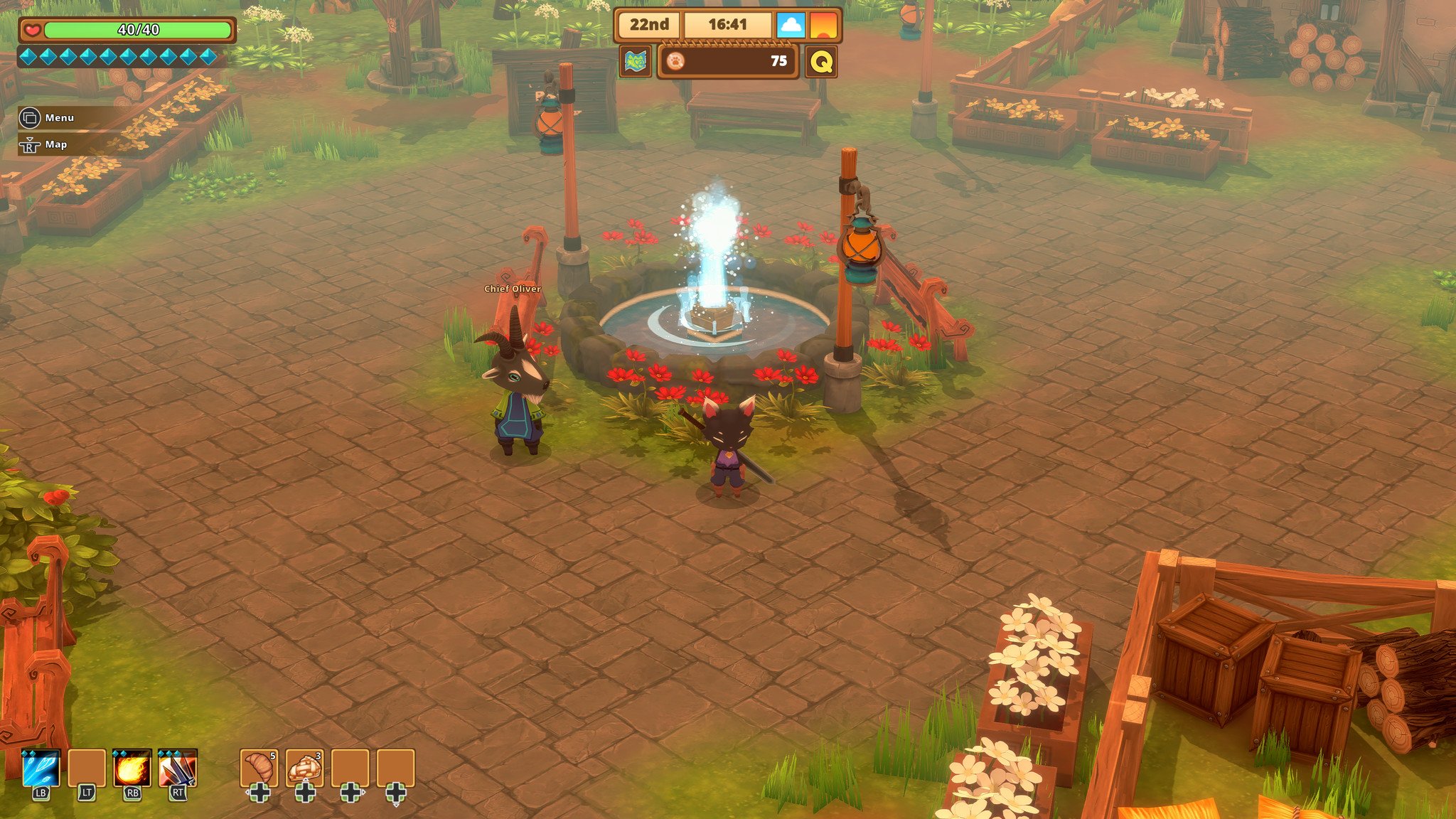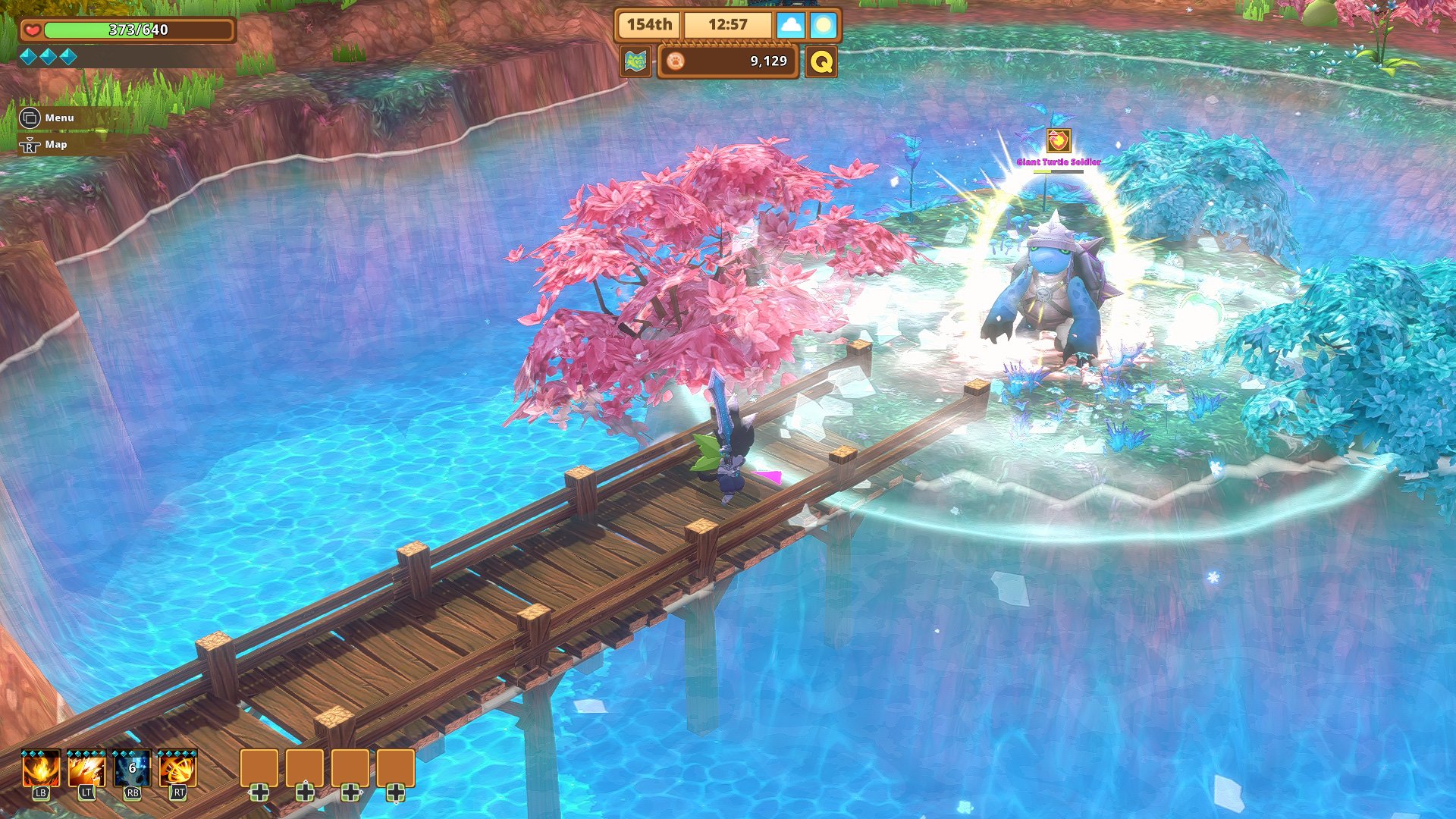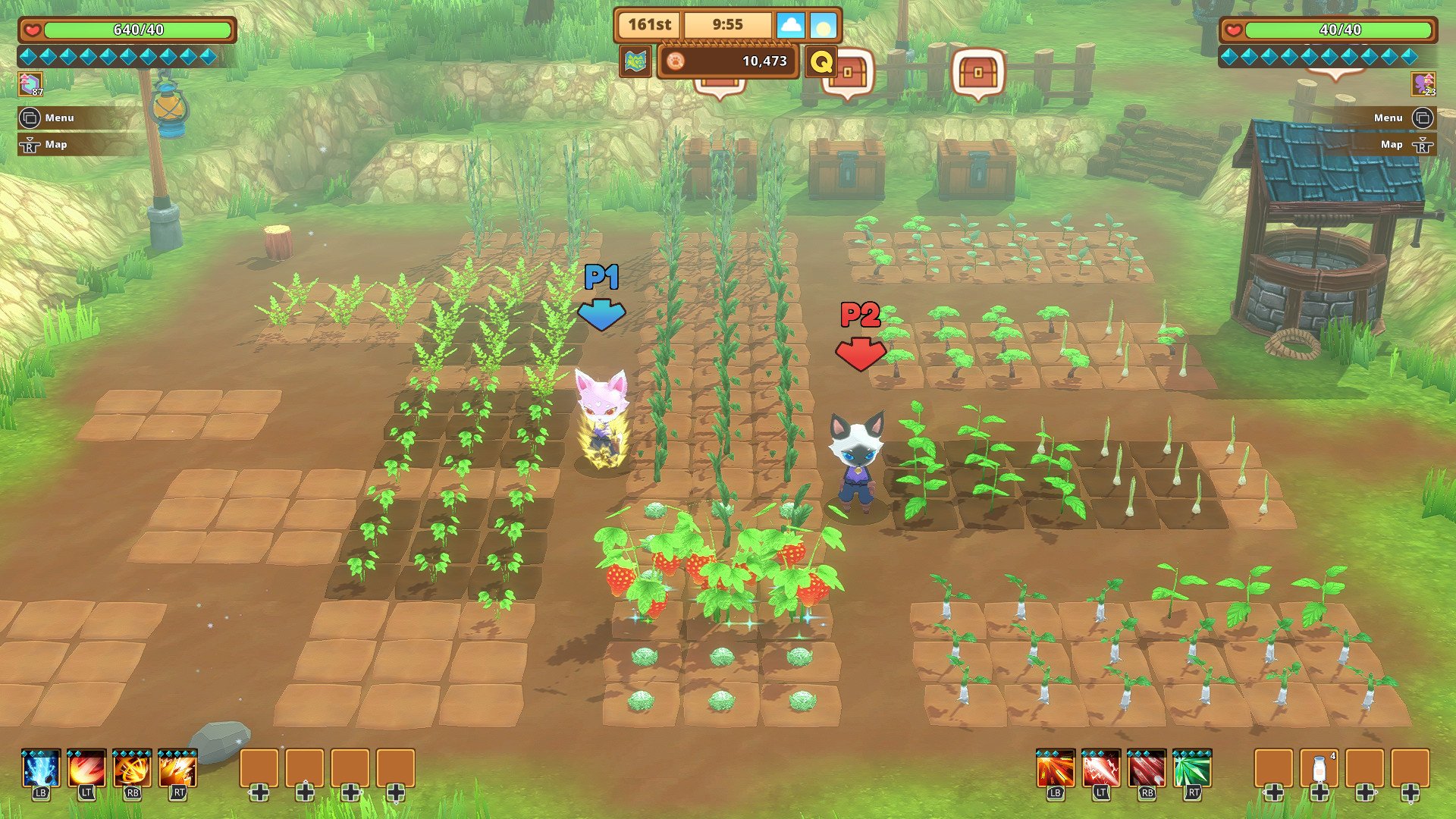Kitaria Fables is wonderfully endearing, but small game design flaws add up to make the game feel too slow
Two genres of video games continue to grow in popularity over time: action-RPGs like Diablo 4 and Minecraft Dungeons, and "life" simulation adventures like Stardew Valley. With Kitaria Fables, developer Twin Hearts and publisher PQube attempt to marry the two genres to create a game that caters to the players that love to grind for the next powerful piece of loot and the players that prefer to relax as they build an entire world in-game.
In Kitaria Fables, players relive the life of Nyanza von Whiskers (or "Nyan" for short), a feline soldier that is deployed to the remote Paw Village with his faithful companion Macaron. In this universe, monsters and "people" (a wide variety of intelligent bipedal versions of animals) are supposed to peacefully coexist, but something is causing the monsters to become increasingly aggressive. It's up to you to protect Paw Village and figure out why the monsters are behaving strangely in the first place.
Kitaria Fables will also have you fight hordes of diverse monsters, collect a veritable smorgasbord of ingredients and resources, build up a farm for crops, craft everything you need to survive, and help the people of Paw Village and the surrounding areas.
If you're a fan of the genres Kitaria Fables melds into one, you'll likely enjoy your time in this impossibly adorable world — as long as you bring plenty of patience, that is.
Kitaria Fables
Bottom line: From its distinctive art style to its decently fleshed-out world, Kitaria Fables is as cute as they come and filled with its own personal brand of charm. However, surprisingly engrossing combat and a stable experience don't cover the myriad of strange game design decisions that cause Kitaria Fables to move at glacial pace.
The Good
- Adorable and appealing visuals
- Simple yet tactile combat
- Stable and polished overall
The Bad
- Progression feels far too slow
- Game length feels artificially extended
- Story is light and short
- Minor typos and writing mistakes are common
$16 at Microsoft (Xbox Standard) $20 at Microsoft (Xbox Deluxe) $40 at Amazon (Switch) See at Steam (PC)
I encountered a potentially a game-breaking bug late in my playthrough of Kitaria Fables that prevented me from completing the game. Until I'm able to finish the game, this is a "review in progress," and captures all my thoughts leading up to that progression-halting issue.
Kitaria Fables: What you'll like
From the first moment you start playing Kitaria Fables, you're struck by its art style and visuals. This a game that immediately brings words to mind like "uwu" (I'm sorry), and those impressions stick with you as you're introduced to new characters, explore new areas, and take on new enemies. Kitaria Fables is cute, plain and simple, but it's also clear that a lot of attention to detail was used to craft its world. The game manages to own a unique style in an increasingly cluttered market, without sacrificing the foundations of a good game.
| Category | Kitaria Fables |
|---|---|
| Title | Kitaria Fables |
| Developer | Twin Hearts |
| Publisher | PQube |
| Genre | Action-adventure RPG |
| Game Size | 2.1GB |
| Players | Singleplayer & two-player local co-op |
| Play Time | 15+ hours |
| Xbox Game Pass | No |
| Launch Date | Sept. 1, 2021 |
| Launch Price | $20-40 |
| Reviewed on | Xbox Series X |
Performance is also exceptional, with narry a dropped frame or stutter at any time while playing. Of course, playing on Xbox Series X likely aided in both the performance and visuals department, but it's undeniable that Twin Hearts did an exemplary job piecing Kitaria Fables together. That being said, while visuals and performance are important to capture initial players, it's ultimately gameplay that divides the good from the great.
Kitaria Fables manages to own a unique style in a cluttered market.
The premise behind Kitaria Fables is relatively simple. It's an action-RPG that features certain aspects of other games like Minecraft and Stardew Valley, with a day / night cycle, weather patterns, farming, crafting, and a basic economy. While you're off battling monsters and saving the world, you're also collecting the ingredients you'll need to craft better gear and consumables, or items that you can sell for a hefty profit. When you're at home, you're carrying out quests for your fellow villagers and managing your growing farm. In the finished product, Kitaria Fables largely succeeds to execute these gameplay mechanics, at least on paper.
The monsters you'll encounter in Kitaria Fables are varied in both appearance and behavior and almost always have a place in the game's crafting and progression systems. Combat is extremely simple but deceptively engaging, with quick reaction speeds and minimum mistakes necessary to consistently come out on top. You can also customize your fighting style, to a degree, with melee swords, ranged bows, and a wide variety of magical spells at your disposal (much of which you'll have to unlock). There are numerous bosses to conquer in Kitaria Fables as well, with each one featuring an entirely unique fighting style and reward.
On the other side of the coin, Kitaria Fables' life simulation elements feel like a lesser part of the game, but they're at least consistent. Farming is essential if you want to earn money for progression, and crafting is necessary for almost everything, so you'll constantly be dipping into your growing stash of random materials. Kitaria Fables' more relaxing half certainly isn't as compelling as games like Stardew Valley, but it is an interesting addition to the action-RPG genre, and perfectly compliments Kitaria Fables' relaxing and adorable atmosphere.
Kitaria Fables: What you won't like
Kitaria Fables' biggest weaknesses are actually the result of many smaller game design decisions that, by themselves, likely wouldn't be that big of a deal. However, the end result is that Kitaria Fables feels like an action-RPG above anything else, but one that moves just as slowly as a life simulation. At the end of the day, Kitaria Fables is just slow, with simple actions and developments taking much longer than you feel they should.
Practically everything related to progression in Kitaria Fables requires crafting, which in turn requires lots of resources and materials. These materials are earned from killing monsters, with each monster dropping unique items. This leads to a constant cycle of grinding for the next batch of resources you need to unlock anything in Kitaria Fables, like weapons.
Grinding is a part of most action-RPGs, but Kitaria Fables requires it at every single turn
Grinding is commonplace in most action-RPGs, but is usually associated with late-game or endgame play, where players are striving to find the best possible gear and loot. In Kitaria Fables, not-insignificant levels of grinding is required for even the most basic upgrades, and the requirements only become more stringent as you move forward.
Escalating this issue to new levels of frustration is how Kitaria Fables provides you with shockingly little information on its world/ Descriptions for items you currently have might tell you how you can obtain it, but this is far from guaranteed. On top of that, Kitaria Fables doesn't provide any information on where monsters, treasure chests, bosses, or materials can be found. It's entirely up to you to remember where everything is.
Further driving home how tedious grinding can be, Kitaria Fables's map is comprised of a ton of smaller areas, each of which may contain different monsters, bosses, and chests. You're can't fast travel between these areas once you've explored them, only to set checkpoints scattered around the map (and you often can't fast travel from these checkpoints, requiring a different marker in a different location). Traveling between the areas is time consuming thanks to relatively slow character movement speed and the constant loading screens between them (on Xbox Series X, these loading screens were never more than one to two seconds, but older hardware may struggle more).
It can take literally hours to grind for one significant equipment upgrade, especially if you don't immediately remember where a specific monster is located (some monsters only appear during certain times of day in specific areas!). But it's not just your own personal upgrades that require grinding. Nearly every quest involves gathering resources, requiring further grinding to progress through the story.
Everything in Kitaria Fables is slow, except for time, and that makes everything feel even more glacial.
It's also up to you to maintain your farm, which takes valuable time out of each game day. You'll have to battle with slightly awkward movement controls, and switching between the various tools you'll use for farming and combat requires jumping into your full inventory constantly, as the game doesn't provide enough shortcuts.
All of this is exasperated by a puzzling aspect of Kitaria Fables: how quickly time moves. Kitaria Fables' days are shockingly short, meaning the simple act of maintaining your farm can take upwards of 3-5 hours a day. Everything in Kitaria Fables is slow, except for time, and that makes everything feel even more glacial. In car terms: Action-RPGs are high-performance vehicles built for long endurance trips, while games like Stardew Valley are comfortable, massive, and built for cruising. Kitaria Fables feels like you've been strapped into a fast car and told to drive, but someone is purposely stomping on the brake the entire time.
Layers upon layers of crafting and grinding makes Kitaria Fables feel it has been artifically extended to take up more of your time. When you step back and consider what has actually happened in Kitaria Fables' story, you realize that what took you 10-12 hours to complete would have only been about three in another game.
Speaking of story, Kitaria Fables' isn't going to win any rewards for its storytelling, and comes off as pretty generic and shallow much of the time. To be fair, here, I have yet to finish Kitaria Fables' campaign, but I appear to be nearing the end and have yet to become attached to any of the characters or become interested in the events that are transpiring.
Kitaria Fables: Should you play it?
It was occassionally frustrating to play Kitaria Fables since it's built on such a fantastic foundation of style and premise. Kitaria Fables attempts to blend two genres of video games, both of which are typically built to be time consuming, but, unfortunately, ends up combining the exact parts of those genres that shouldn't be together.
I enjoyed so much of my time with Kitaria Fables, but tiny game design decisions snowballed into a game that's difficult to truly sink your teeth into without hefty amounts of patience and a capable memory. Faster movement, better fast travel, a more informative map or player journal, longer days, lower requirements for crafting, more varied quests — all of these would go a long ways towards delivering Kitaria Fables closer to its potential.
Still, Kitaria Fables is a charming and lovely game at its core, and it's still more than possible to have fun while playing. If you're already predisposed towards slow-moving games like Stardew Valley but desire more combat elements, there's still plenty to love in this feline-led adventure. Just bear in mind that you'll need to work for even the simplest upgrades.
Kitaria Fables probably isn't going to be considered one of the best Xbox games in its current state, but my time in Paw Village was mostly well-spent (even if I spent a little too much).
Kitaria Fables
Bottom line: Despite beautiful and cute visuals and a solid foundation, Kitaria Fables falls short of greatness thanks to a myriad of slow game designs. There's still lots to love about Kitaria Fables, but only if you're equipped with plenty of patience.
$16 at Microsoft (Xbox Standard) $20 at Microsoft (Xbox Deluxe) $40 at Amazon (Switch) See at Steam (PC)











No comments: